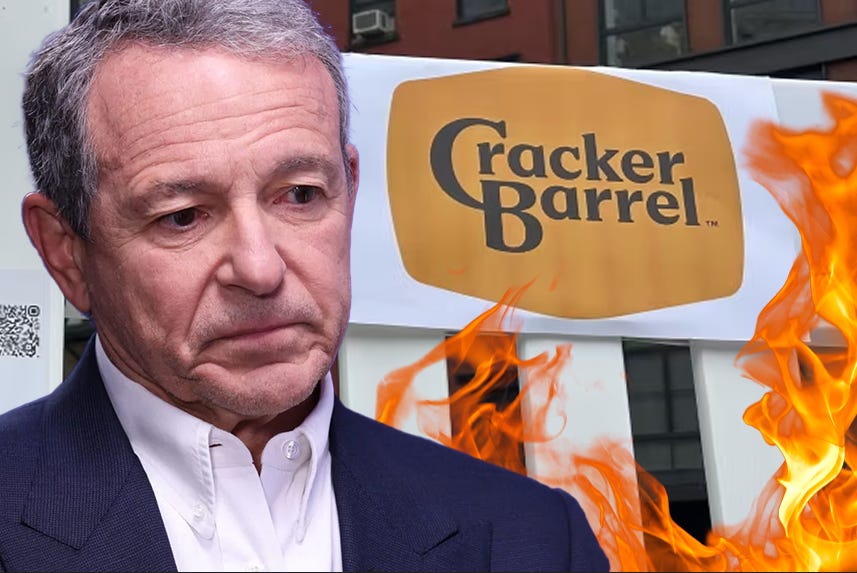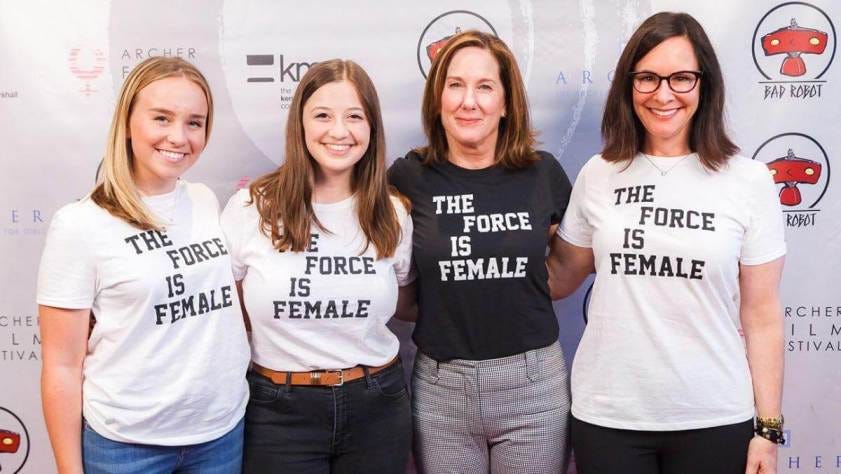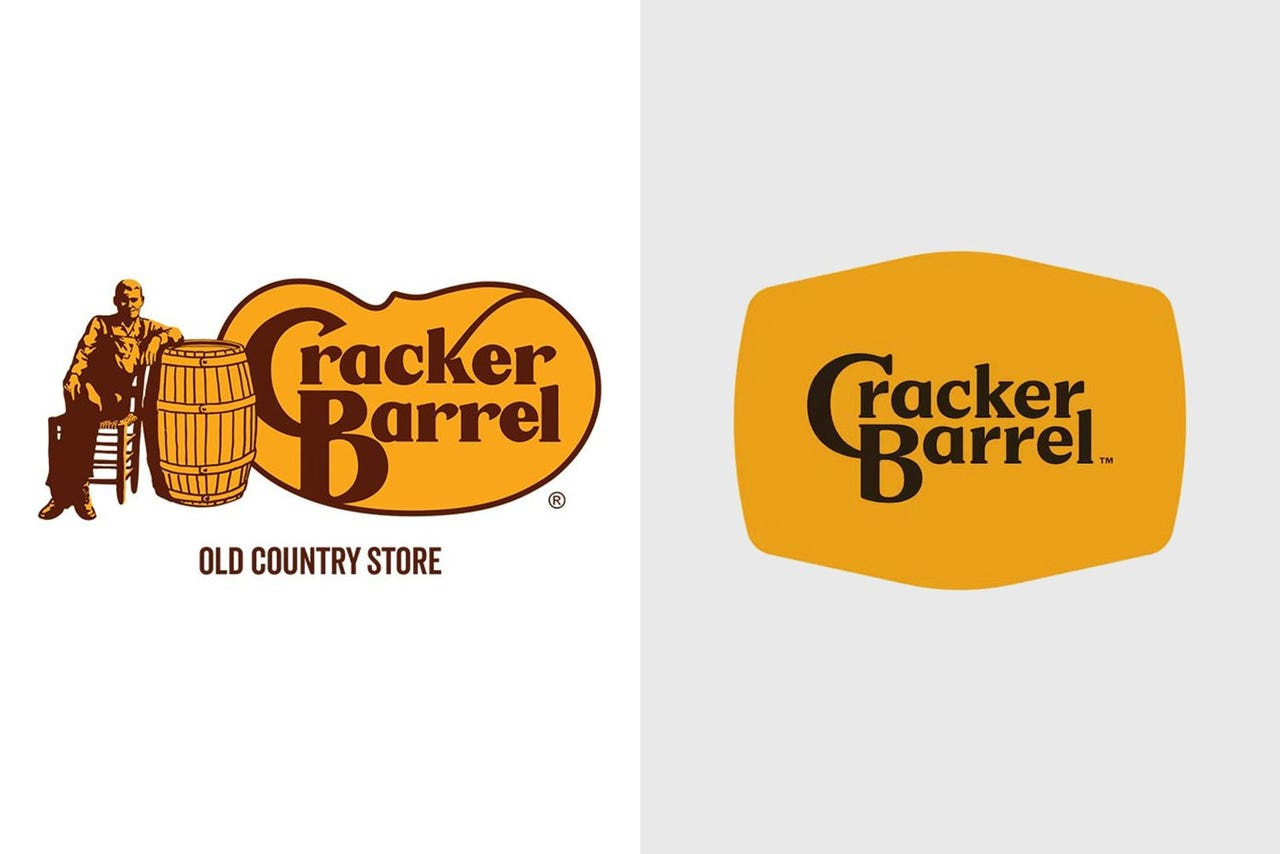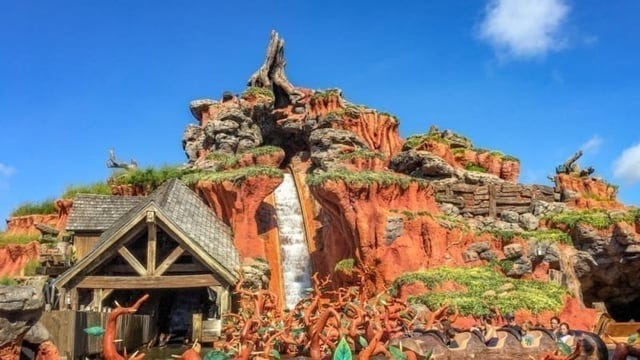What Disney Could Learn from Cracker Barrel's Disastrous Rebrand.
In a stunning admission that's sending shockwaves through Hollywood, Disney executives are reportedly scrambling to create new male-focused brands after years of reorienting powerhouse franchises like Star Wars and Marvel toward female audiences.
According to recent leaks and industry reports, the House of Mouse has realized it's alienated a key demographic—Gen Z men aged 13-28—who once flocked to lightsabers and superhero showdowns but now feel sidelined by what some critics call "girl boss" narratives.
This pivot comes amid box office slumps and streaming struggles, begging the question: Could Disney avoid a total meltdown by studying the fresh wounds of Cracker Barrel's botched rebrand?
Here’s the TL;DR…
Disney is ditching over-reliance on Star Wars and Marvel after admitting they've lost young male fans to "woke" overhauls.
Cracker Barrel's 2025 logo redesign ignored investor warnings and customer loyalty, leading to a stock plunge and hasty reversal.
Activist investor Nelson Peltz echoed similar criticisms at Disney, slamming agenda-driven changes in Marvel films.
Examples of Disney's tone-deaf moves include Star Wars sequels that divided fans and Marvel flops like The Marvels that prioritized messaging over entertainment.
Key lesson: Family-friendly giants must balance audience growth without abandoning their core base, or risk ending up with nobody.
Disney's Pivot: Chasing Lost Male Fans After Years of Alienation
Disney's current predicament isn't just a blip—it's a symptom of a broader corporate trend where beloved brands chase inclusivity or modernization at the expense of their foundational fans.
Recent reports from Variety highlight how the studio is now pressing creatives for original IP like global adventures and treasure hunts to lure back Gen Z men, acknowledging that Marvel and Star Wars have "stumbled" in retaining young males.
Insiders note the mandate reaches the C-suite, with David Greenbaum leading the charge for "guy-leaning" fare, as the company grapples with no Star Wars films since 2019 and MCU fatigue.
This comes after years of shifting focus to female empowerment, with projects like The Acolyte and She-Hulk drawing ire for perceived agenda-pushing. Fan data from The Wrap shows Star Wars skews 65-70% male, and the MCU 60-65% male, yet Disney's strategy has left many feeling sidelined.
Cracker Barrel's Tone-Deaf Overhaul: Ignoring Warnings from Investors and Customers
Cracker Barrel, the quintessential Southern comfort chain known for its rocking chairs and homestyle cooking, provides a cautionary tale that's eerily parallel.
In early 2025, under new CEO Julie Felss Masino, the company unveiled a minimalist logo redesign aimed at attracting younger diners and shedding its "old-fashioned" image. The move was part of a larger "strategic transformation plan" to boost flagging traffic, which had dropped 16% since pre-pandemic highs.
But the backlash was swift and savage: Social media erupted with memes decrying the new look as "soulless" and "corporate bland," while loyal patrons vowed boycotts.
What makes Cracker Barrel's fiasco particularly relevant to Disney is the ignored warnings from within. Top investor Sardar Biglari, who holds a significant stake, had publicly lambasted the rebrand as "obvious folly" in 2024 via his dedicated critique site.
He argued that tampering with the brand's nostalgic, family-oriented identity would alienate core customers without guaranteeing new ones. Biglari's predictions proved prophetic: The stock dipped 7% amid the uproar, forcing Cracker Barrel to scrap the new logo, keep the iconic "Old Timer" rocking chair figure, and issue a mea culpa about "listening to customers."
CEO Masino, despite her Taco Bell pedigree, was accused of being tone-deaf to the chain's heartland appeal, much like how Disney's leadership has been criticized for overlooking fan feedback.
Parallels with Nelson Peltz: Activist Investors Sound the Alarm on Agenda-Driven Changes
Enter Nelson Peltz, the activist investor whose 2024 proxy battle with Disney mirrors Biglari's warnings.
Peltz, controlling a $3.5 billion stake through Trian Partners, blasted Disney for injecting "woke" elements into Marvel films, questioning why movies like Black Panther (with its predominantly Black cast) or The Marvels (an all-female-led ensemble) needed to prioritize diversity over broad appeal.
"Why do I need an all-women Marvel film? Why do I need an all-Black cast?" Peltz reportedly asked in interviews, arguing that such decisions diluted entertainment value and chased away male viewers.
Disney fired back, labeling Peltz a "bully" unfit for the board and defending their inclusive storytelling as key to modern success.
Yet, fast-forward to 2025, and Disney's internal memos—leaked via Variety and other outlets—reveal a desperate hunt for "original IP" tailored to Gen Z boys, acknowledging that Star Wars and Marvel have "stumbled" in retaining young men.
Peltz's critiques, once dismissed, now seem prescient as Disney grapples with the fallout.
Disney's "Cracker Barrel Moments": Tone-Deaf Moves That Cost Them Dearly
Disney has "Cracker Barrel-ed" itself multiple times by ignoring customer signals, often paying dearly in ticket sales and subscriber churn.
Take Star Wars: The sequel trilogy, starting with The Force Awakens in 2015, initially thrilled fans but quickly soured.
The Last Jedi (2017) divided the fandom with subversive twists on legacy characters like Luke Skywalker, leading to review-bombing and boycotts. Director Rian Johnson's choices were praised for innovation but slammed for disregarding the saga's heroic roots.
By The Rise of Skywalker (2019), the trilogy felt like damage control, yet it couldn't stem the tide—Disney hasn't released a Star Wars film since, and series like The Acolyte faced similar backlash for perceived agenda-pushing over lore fidelity. Fan surveys and box office data show a sharp drop in male engagement, with Disney Plus skewing heavily male yet failing to deliver content that resonates.
Marvel's Phase 4 and 5 offer even starker examples. After the Infinity Saga's peak with Avengers: Endgame (2019), films like The Marvels (2023) bombed spectacularly, grossing just $206 million worldwide against a $270 million budget.
CEO Bob Iger blamed production issues, but insiders and critics pointed to an overemphasis on female-led stories and social messaging that alienated core comic book fans—predominantly young men.
Shows like She-Hulk and Echo drew similar ire for prioritizing diversity quotas over compelling narratives, leading to "superhero fatigue" that's hammered Disney's stock.
Even Black Panther: Wakanda Forever (2022), while successful, couldn't match its predecessor's buzz amid broader MCU disillusionment. Disney's response? Blaming fans or external factors, much like Cracker Barrel initially doubling down on its rebrand before caving.
These missteps highlight a pattern: Family-friendly companies like Disney and Cracker Barrel thrive on nostalgia and inclusivity for all ages, but rebrands that feel forced can backfire spectacularly.
Cracker Barrel's quick reversal shows humility can salvage a situation, yet Disney's slower pivot—still pumping out content like the upcoming Rey Skywalker film—suggests they're not fully heeding the lesson.
Disney's Theme Park Missteps: Rebrands That Alienated Loyal Fans
Disney's theme parks, billed as the "Happiest Place on Earth," have stumbled with rebrands that mirror Cracker Barrel's tone-deaf logo flop.
By prioritizing modernization or agenda-driven changes over fan nostalgia, these "Cracker Barrel moments" have sparked backlash, reduced attendance, and eroded goodwill—proving even magical kingdoms aren't immune to ignoring their core audience.
Splash Mountain to Tiana's Bayou Adventure
The most prominent example is the 2020 decision to retheme Splash Mountain into Tiana's Bayou Adventure at Disneyland and Magic Kingdom.
The original log flume, based on the controversial Song of the South (1946), faced criticism for racial stereotypes. In the wake of 2020's social justice wave, Disney reimagined the ride with Princess Tiana from The Princess and the Frog (2009).
When the new version opened in 2024, it drew praise for inclusivity but also flak for a disjointed story and a lack of the original's thrills. Fans launched #SaveSplashMountain petitions with over 21,000 signatures and mourned its January 2023 closure with four-hour queues.
Disney’s later pivot to describe the update as a “merger” of legacies felt like a backpedal after years of distancing itself from Song of the South.
Other Controversial Ride Rebrands
Splash Mountain isn’t the only casualty. In 2017, Disneyland’s Tower of Terror became Guardians of the Galaxy: Mission Breakout!, trading The Twilight Zone’s eerie storytelling for a Marvel superhero drop tower. Fans blasted it as a generic cash grab, missing the original’s haunting immersion.
At EPCOT, the 2016 replacement of Maelstrom, a Viking-themed boat ride, with Frozen Ever After traded cultural storytelling for a sing-along, frustrating purists who valued World Showcase’s authenticity.
The Muppets have also taken a hit. MuppetVision 3D at Disney’s Hollywood Studios lost its themed courtyard in 2016 to make way for Star Wars expansions, and many fans fear its full closure as Disney pushes newer IPs.
Chipping Away at Nostalgia
Other shifts include Rivers of America at Magic Kingdom, where Tom Sawyer Island and the Liberty Square riverboat were scaled back in 2017 to clear space for Star Wars: Galaxy’s Edge. Frontierland lost much of its old charm in the process.
Meanwhile, EPCOT’s Journey Into Imagination, once a whimsical ride with Dreamfinder and Figment, was gutted in 1999 and 2002 refurbishments. The dreamy narrative was replaced with a sterile lab theme, sparking fan outcry that continues to this day.
The Cost of Alienating Die-Hard Fans
These changes have cost Disney in fan loyalty and attendance, with social media amplifying complaints and boycotts much like Cracker Barrel’s stock dip.
Just as Cracker Barrel had to reverse its logo rebrand, Disney’s theme park missteps show that ignoring die-hard fans risks empty queues and a tarnished brand.
Nostalgia is the parks’ lifeblood—tinker too much, and the magic fades.
What Went Wrong with Cracker Barrel's 2025 Rebrand?
The chain's shift to a sleek, modern logo alienated its core audience of older, rural diners who cherished the brand's cozy, vintage vibe. Despite CEO Masino's push for youth appeal, it ignored warnings from investor Sardar Biglari, resulting in a 7% stock drop and widespread mockery online. Lesson: Test changes with loyalists first.
How Has Disney Alienated Male Fans with Star Wars and Marvel?
By emphasizing female empowerment and diverse casts in projects like The Acolyte and The Marvels, Disney shifted away from the action-hero focus that drew boys. Reports confirm a loss of Gen Z men, with no Star Wars films since 2019 and MCU viewership dipping. Critics like Peltz called it out early.
What Did Nelson Peltz Say About Disney's "Woke" Strategy?
Peltz criticized films for being agenda-driven, questioning the need for all-female or all-Black ensembles in Marvel. He urged a return to entertainment-first storytelling to "restore the magic."
Why Do Rebrands Fail for Family-Friendly Brands?
They often prioritize trends over heritage, alienating families who seek familiarity. Examples include Gap's 2010 logo flop or Tropicana's packaging change—both reversed after backlash. Communication and customer involvement are key.
Can Disney Recover Its Male Audience?
Possibly, by developing fresh IPs focused on adventure and heroism, as current plans suggest. But they must avoid repeating Star Wars' sequel errors and listen to feedback, or risk further erosion.
Essential Lessons for Family-Friendly Companies: Balance Growth Without Losing Your Core
In wrapping up, the big takeaway for family-friendly juggernauts like Disney is balance.
It's smart to evolve and expand audiences—Cracker Barrel needed younger patrons, just as Disney wants broader appeal—but gambling everything on untested changes is reckless.
As rebrand experts note, failing to explain shifts or gauge sentiment can lead to chaos. Disney paid billions for Star Wars and Marvel to capture boys' imaginations; alienating them means rebuilding from scratch.
Ignore your core at your peril—you might end up with rocking chairs gathering dust and empty theaters. Family brands succeed by uniting generations, not dividing them. If Disney learns from Cracker Barrel's humility, it could reclaim its throne. Otherwise, the Force—and the fans—might not be with them.
Sources
Not the Bee — After Push to Make Male-Oriented Franchises More Female, Disney Now Seeking Ideas for Films Aimed at Young Men (Aug 21, 2025)
Variety — Disney, Marvel, Lucasfilm Struggle With Gen Z Male Audience (Aug 21, 2025)
OutKick — Disney Studios Request Pitches to Win Back Young Male Audience (Aug 21, 2025)
GamesRadar — Disney Looks Beyond Marvel and Star Wars to Lure Gen Z Males (Aug 21, 2025)
Pirates & Princesses — Disney Chased Men Out of Marvel and Star Wars (Aug 22, 2025)
Fox Business — Cracker Barrel Ignored Investor Warnings on Rebrand (Aug 21, 2025)
CNN — Cracker Barrel’s New Logo Sparks Backlash (Aug 21, 2025)
Fox Business — Cracker Barrel Keeps Old Timer Logo After Backlash (Aug 22, 2025)
Fox Business — CEO Julie Felss Masino Under Fire for Logo Controversy (Aug 22, 2025)











